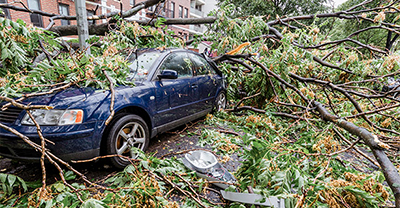Does renters insurance cover car theft?


0 min. read
If my car is stolen, will renters insurance cover it?
The short answer is no. Car theft isn't a coverage option on renters insurance policies. You need comprehensive auto insurance to cover the costs of replacing or repairing a stolen vehicle. Renters insurance may, however, cover your possessions if they're stolen from your vehicle.
Are car theft and car break-ins both covered by renters insurance?
Typically, the personal property coverage provided by renters insurance policies extends beyond your living space to your car, places like the laundromat, or when you’re on vacation. Your vehicle itself—whether it’s stolen or just damaged during a break-in—isn't covered by a renters insurance policy.
If you have items on your car, like bikes on your roof rack, your renters policy may cover the actual cash value or the replacement cost of the stolen bicycles. Your renters policy probably won't cover the roof rack if it was damaged.
A good general guide to whether your renters insurance policy covers something related to your vehicle is:
Renters insurance can cover most aspects of your personal belongings.
Your car insurance policy can cover most aspects of your vehicle.
Here’s a hypothetical scenario to help illustrate what each type of insurance may help cover:
During the night, your car's windows are smashed and your smartphone, laptop, and your wedding ring are stolen.
In this situation, the comprehensive coverage on your auto insurance policy can help cover the window damage to your car, while your renters insurance can help cover your phone and laptop.
The ring, however, falls under the fine jewelry category. Your auto insurance carrier isn't responsible, but your renters policy might not cover the full loss either if:
You don't have scheduled property coverage on your policy
You have scheduled property coverage on your jewelry, but you didn't declare this ring when setting up your policy
How are renters insurance policies structured?
If you're new to researching renters insurance, it helps to understand the difference between the following two types of policies:
Actual cash value renters insurance
If you experience a loss through theft (such as your home or car getting broken into and valuables stolen), an actual cash value policy pays you the amount those items are worth based on their age and condition. You'll enjoy comparatively low premiums, but if your belongings are destroyed or stolen and never recovered, you likely won't be compensated enough to completely replace the items.
Replacement cost renters insurance
Replacement cost coverage comes with more expensive monthly premiums than an actual cash value policy. But it means that even if your stolen laptop was 5 years old, you'll be compensated for the full cost of buying a new one.

What does renters insurance cover?
A typical renters insurance policy helps cover losses in four main categories: personal property, loss of use/living expenses, liability, and medical payments for non-resident guests. Each insurer may have different definitions and limits within these categories, so always make sure to consult your insurance agent to confirm coverage.
Personal property
Personal property is what many people usually associate with renters insurance. It can encompass the value of all the belongings in your home—clothing, jewelry, furniture, kitchen items, electronics, and even décor. When purchasing renters insurance, you will select a policy limit that covers the total value of your possessions. It can be a tough number to get your head around, but many insurers offer worksheets that can help you make that judgement.
Things often not included in the definition of personal property are:
Permanent fixtures (like a refrigerator or dishwasher that came with the rental property)
Your roommate’s property
Vehicles
In the case of a covered incident, renters insurance will pay out a claim up to the limit of your policy, and sometimes a specific limit on certain categories of property. Jewelry is one that often has a cap, which is why insurers usually offer add-on coverage for specific, valuable items.
Loss of use or living expense
Loss of use or living expense refers to a type of claim you can make if severe damage to your building or unit causes you to temporarily relocate from your rental property. This type of protection can cover temporary lodging, meals, and other expenses that mount up while you’re displaced.
Most renters policies don't provide living expense coverage when mice, roaches, bedbugs, or other similar nuisances cause relocation. Pest infestations aren't covered disasters because they're considered part of normal home maintenance.
Covered disasters typically include:
Smoke
Wind
Fire
Lightning
Water damage*
*Note: For water damage to be a covered disaster, the source of the water must be from inside the dwelling (e.g., a plumbing leak). Loss of use coverage doesn't cover water damage from external sources (e.g., weather-related flooding).
Personal liability
Personal liability can cover another party’s legal and medical fees associated with an accident, injury, or property damage where you are at fault. While this most often applies to someone being injured on your property, it can also cover inadvertent injury or damage you cause to someone else or their property.
If that person were to sue you for damages, or they needed extensive medical care, and you were uninsured, you could end up paying out large sums of money. That’s why it’s important that your renters insurance has this sort of protection. Typical personal liability limit on a renters insurance policy is $100,000, but you should always check your policy for specifics.
Medical payments for non-resident guests
Medical payments for non-resident guests sounds like it should be covered under personal liability, but there are some key differences. Medical payments coverage typically applies to smaller injuries with lower associated costs—no more than around $5,000. It also doesn’t matter who is at fault for the accident.
For example, if a visiting friend cuts themselves while cooking and needs an ambulance ride to the hospital, medical payments for non-resident guests could potentially cover those costs.
Additional optional rental insurance coverages
Some insurers offer additional rental coverage options for higher premiums. Optional add-on coverages can include higher limits on specific valuable items or on events outside of typical coverage.
Scheduled property
Standard renters insurance providers put coverage limits on certain categories of your personal property. For example, a policy may only cover up to $1,500 in jewelry or $2,500 in firearms and related equipment.
If your belongings in those categories are valued higher than the limits, it’s worth looking into an endorsement or scheduled personal property coverage for those items. With this extra coverage, your valuable items can be removed from the total of your regular coverage, and dealt with separately.
Unauthorized credit/debit card use
In the case of fraud or identity theft, this coverage can help pay for losses from a stolen credit/debit card, check forgeries, and other transactions not made by you and without your permission. Your premium coincides with the limit you choose for unauthorized transaction coverage.
Flood or natural disaster
The damage caused by many natural disasters are covered by base renters insurance policies, but there are a couple of common exceptions. Sometimes insurance companies don’t cover certain disasters at all—instead you can purchase insurance through a national organization.
Weather-related flooding, earthquakes, volcanic eruptions, and other “earth movements” need additional coverage. Premiums can vary based on your location relative to risk—like if you’re near a fault line or in a flood zone—and coverage limit.
The general information in this blog is for informational or entertainment purposes only. View our blog disclaimer.
*Data accuracy is subject to this article's publication date.










